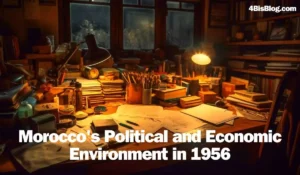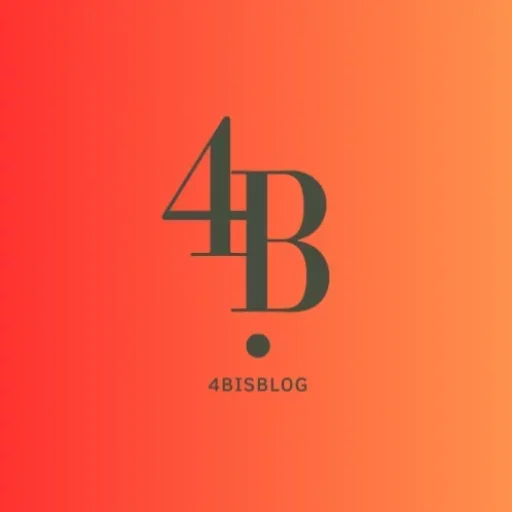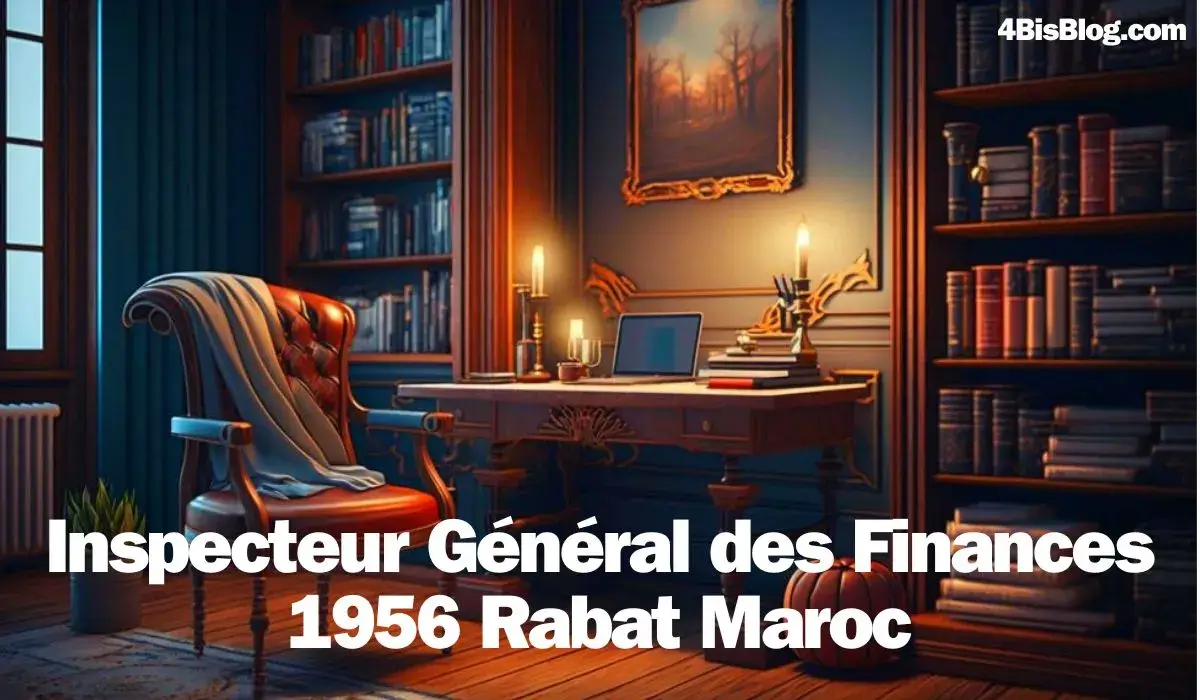The Title “inspecteur général des finances 1956 rabat maroc” refers to the position of Inspector General of Finances in Rabat, Morocco in the year 1956. In that time, an Inspector General of Finances was a significant role overseeing financial matters in Morocco.
Rabat, being the capital, held importance in such positions. This article explores the responsibilities and significance of the Inspector General of Finances in Morocco during the year 1956.
The Inspecteur Général Des Finances’s Role in 1956 Morocco
In 1956, Morocco’s Inspecteur Général Des Finances played a pivotal role in the nation’s financial landscape.
This position, responsible for overseeing financial affairs, held significant influence in shaping economic policies and ensuring fiscal stability within Morocco. The role involved monitoring budgets, conducting audits, and advising governmental bodies on financial matters.
Understanding the responsibilities and impact of the Inspecteur Général Des Finances during this period sheds light on the economic dynamics of post-independence Morocco. Explore the historical significance and contributions of this vital position to Morocco’s financial governance in 1956.
Inspecteur Général Des Finances 1956 Rabat Maroc
This heading refers to the role and significance of the Inspector General of Finances in the city of Rabat, Morocco, during the year 1956.
It delves into the specific responsibilities and impact of this position on the financial landscape of Rabat and Morocco during that historical period.
Inspector General’s Role:
- Oversaw financial matters in Rabat, the capital of Morocco in 1956.
- Held a significant position influencing fiscal policies and economic strategies.
Financial Oversight:
- Monitored budgets and expenditures crucial for the economic stability of Rabat and wider Morocco.
- Conducted audits to ensure transparency and efficiency in financial operations.
Advisory Function:
- Provided essential guidance and recommendations to governmental bodies on financial decisions.
- Played a crucial role in shaping economic policies post-independence.
Understanding the role and impact of the Inspecteur Général Des Finances in 1956 Rabat, Morocco, illuminates the financial dynamics and governance crucial to the country’s development during that period.
Famous Inspecteurs Généraux Des Finances in Rabat in the 1950s
This heading highlights significant Inspecteurs Généraux Des Finances in Rabat, the capital of Morocco, throughout the 1950s. It aims to explore and shed light on prominent figures who held the position during this pivotal decade, impacting the financial landscape of Rabat and Morocco.
1. Economic challenges ahead
This subheading acknowledges the economic hurdles faced during the 1950s by Rabat and Morocco. It aims to delve into the financial complexities and obstacles encountered by the Inspecteurs Généraux Des Finances, shedding light on their efforts and strategies to navigate and overcome these challenges.
Understanding the economic context provides insights into the roles and decisions made by these notable figures in steering the financial course of Rabat during this critical period.
Mid-20th Century Reforms and Modifications Made to the Inspection Générale Des Finances
This heading explores the evolution and transformations within the Inspection Générale Des Finances (IGF) during the mid-20th century.
It delves into the reforms and changes instituted within this financial oversight body, examining its adaptations and developments during a crucial period.
The mid-20th century marked a significant era for the IGF, witnessing shifts in policies, organizational structures, and approaches to financial oversight.
This exploration aims to uncover the nature of these reforms and their impact on the IGF’s functionality and role in governing financial affairs.
Understanding the alterations and adaptations within the Inspection Générale Des Finances during this period offers insights into the evolving dynamics of financial governance, regulatory measures, and the strategies adopted to cope with changing economic landscapes.
Delve into this exploration to comprehend the reforms and changes that shaped the Inspection Générale Des Finances during the transformative mid-20th century, influencing its functionality and impact within the financial realm of its jurisdiction.


Morocco’s Political and Economic Environment in 1956
This heading encapsulates the intertwined political and economic circumstances prevailing in Morocco during 1956.
It aims to provide insights into the overall landscape that influenced policies, decisions, and societal dynamics in the country during this crucial period.
1. Political Climate
This section delves into the political atmosphere prevalent in Morocco during 1956. It explores the governance structure, leadership dynamics, and significant events shaping the political landscape of the country during that time.
2. Economic Situation
Here, the economic conditions of Morocco in 1956 are examined. It encompasses factors such as industries, trade, employment, and financial stability, providing a comprehensive view of the economic state of the nation.
3. Standard of Living
This section discusses the quality of life and well-being experienced by the populace in Morocco during 1956. It touches upon societal aspects, living conditions, access to basic amenities, and overall standards of living prevalent in the country during that period.
Exploring these subtopics underlines the intricate relationship between political governance, economic stability, and societal well-being in Morocco during the pivotal year of 1956.
The Inspecteurs Généraux Des Finances’ Influence on Modern Morocco
This heading focuses on the enduring impact of the Inspecteurs Généraux Des Finances on shaping the contemporary landscape of Morocco.
It delves into the lasting contributions made by these figures, outlining their influence on the country’s modernization and financial systems.
1. Reforming the Tax System
This section explores the initiatives undertaken by the Inspecteurs Généraux Des Finances to revamp and improve Morocco’s tax framework. It highlights the strategies employed to make the system more efficient, equitable, and conducive to the nation’s economic growth.
2. Balancing the Budget
Here, the focus is on the efforts directed towards achieving fiscal stability and equilibrium within Morocco’s budget. It delves into the measures taken by these inspectors to manage expenditures, enhance revenue streams, and ensure a balanced budgetary framework.
3. Modernizing Government Accounting
The actions made by the Inspecteurs Généraux Des Finances to modernize and simplify the accounting procedures used by the Moroccan government are described in this section. It provides information on the programs designed to increase financial management’s responsibility, efficiency, and openness.
Exploring these subtopics illuminates the enduring influence of the Inspecteurs Généraux Des Finances in shaping Morocco’s contemporary financial systems and governance practices.
Conclusion
In summary, the Inspecteurs Généraux Des Finances played a pivotal role in shaping Morocco’s financial landscape in 1956. Their legacy endures through reforms in taxation, budget balancing, and modernized government accounting.
These initiatives have had a lasting impact, contributing to Morocco’s economic stability and governance structures today. The political and economic context of 1956 provided a backdrop for their influential decisions, impacting the nation’s trajectory.
Understanding this historical period sheds light on the intricate connections between fiscal governance, societal well-being, and the enduring legacy of these financial overseers in shaping modern Morocco’s financial systems.
FAQ’s
1. What is the role of the Inspecteur Général des Finances in Morocco?
The Inspecteur Général des Finances in Morocco oversees financial matters, ensuring compliance, and advising on fiscal policies for economic stability.
2. When was the Inspecteur Général des Finances established in Morocco?
The establishment date of the Inspecteur Général des Finances in Morocco was in (YEAR), crucial for financial oversight and management.
3. Who is the current Inspecteur Général des Finances in Morocco?
The current Inspecteur Général des Finances in Morocco is (NAME), responsible for overseeing financial affairs in the country.
4. What is the collaboration of the Inspecteur Général des Finances with the Ministry of Economy and Finance?
The Inspecteur Général des Finances collaborates closely with the Ministry of Economy and Finance, providing guidance on financial decisions and ensuring transparency in financial operations.
5. What is the mission of the Inspecteur Général des Finances in Morocco?
The mission of the Inspecteur Général des Finances in Morocco is to monitor budgets, conduct audits, and advise on financial matters to promote economic stability and efficiency within the country.
Read More Articles:
https://www.4bisblog.com/how-to-add-dashboards-to-unleashed-x/
https://www.4bisblog.com/a-fatal-error-occurred-when-running-fusee/
https://www.4bisblog.com/5-tips-for-saving-money-on-home-insurance-in-atlanta/

